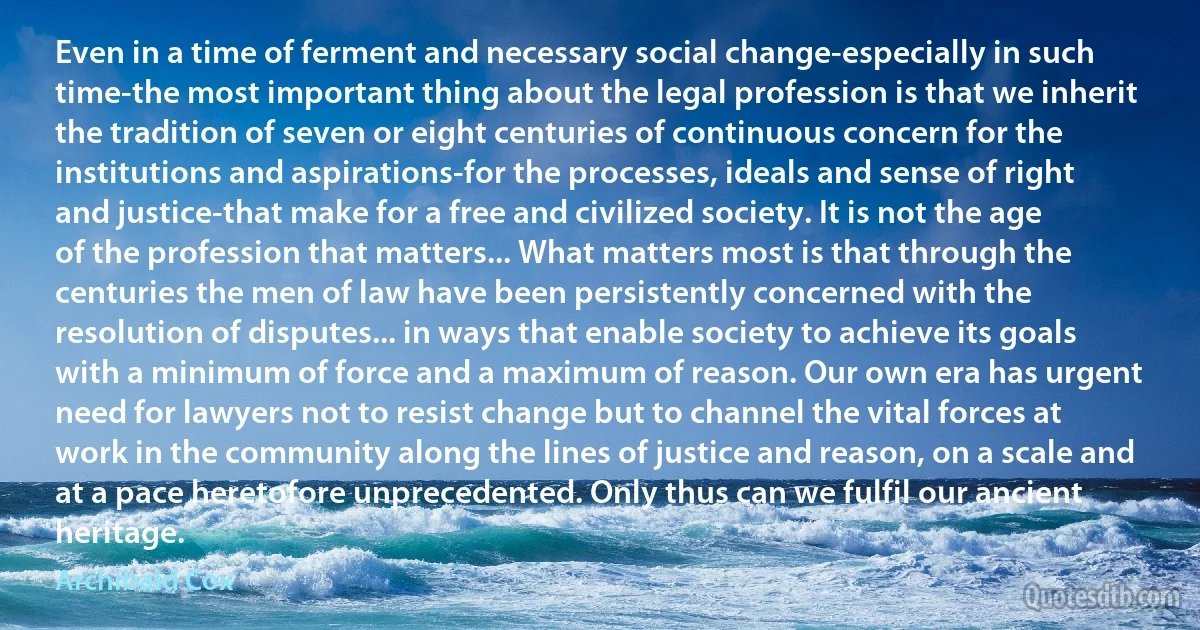
Even in a time of ferment and necessary social change-especially in such time-the most important thing about the legal profession is that we inherit the tradition of seven or eight centuries of continuous concern for the institutions and aspirations-for the processes, ideals and sense of right and justice-that make for a free and civilized society. It is not the age of the profession that matters... What matters most is that through the centuries the men of law have been persistently concerned with the resolution of disputes... in ways that enable society to achieve its goals with a minimum of force and a maximum of reason. Our own era has urgent need for lawyers not to resist change but to channel the vital forces at work in the community along the lines of justice and reason, on a scale and at a pace heretofore unprecedented. Only thus can we fulfil our ancient heritage.
Archibald CoxRelated topics
age change eight era force free justice men law maximum necessary need pace reason right sense seven thing thus time vital work waysRelated quotes
I take the liberty of asserting that there is one valid reason, and only one, for either punishing a man or rewarding him in this world; one reason, which ancient piety could well define: That you may do the will and commandment of God with regard to him; that you may do justice to him. This is your one true aim in respect of him; aim thitherward, with all your heart and all your strength and all your soul, thitherward, and not elsewhither at all! This aim is true, and will carry you to all earthly heights and benefits, and beyond the stars and Heavens. All other aims are purblind, illegitimate, untrue; and will never carry you beyond the shop-counter, nay very soon will prove themselves incapable of maintaining you even there. Find out what the Law of God is with regard to a man; make that your human law, or I say it will be ill with you, and not well!

Thomas Carlyle
Although dialogue, by itself, will not be sufficient to address these issues – because concrete action is needed – initiating a broad, frank, and inclusive conversation is a necessary and productive first step. In all of the Civil Rights Division's activities in Ferguson – as in every pattern-or-practice investigation the Division has launched over the last six years – our aim is to help facilitate and inform this conversation; to make certain it leads to concrete action; and to ensure that law enforcement officers in every part of the United States live up to the same high standards of professionalism. It is clear from our work throughout the country-particularly the work of our Civil Rights Division-that the prospect of police accountability and criminal justice reform is an achievable goal; one that we can reach with law enforcement and community members at the table as full partners.

Eric Holder
He loved his profession, he had a real sense of dedication to the administration of justice, he held his head high as a lawyer, he rendered and exacted courtesy, honor and straightforwardness at the Bar. He respected the judicial office deeply, demanded the highest standards of competence and disinterestedness and dignity, despised all political use of or trifling with judicial power, and had an affectionate regard for every man who filled the exacting prescription of the just judge. The law to him was like a religion, and its practice was more than a means of support; it was a mission. He was not always popular in his community, but he was respected. Unpopular minorities and individuals often found in him their only mediator and advocate. He was too independent to court the populace - he thought of himself as a leader and lawgiver, not a mouthpiece.

Robert H. Jackson
The effort necessary to remain uncorrupted in an environment where fear is an integral part of everyday existence is not immediately apparent to those fortunate enough to live in states governed by the rule of law. Just laws do not merely prevent corruption by meting out impartial punishment to offenders. They also help to create a society in which people can fulfil the basic requirements necessary for the preservation of human dignity without recourse to corrupt practices. Where there are no such laws, the burden of upholding the principles of justice and common decency falls on the ordinary people. It is the cumulative effect on their sustained effort and steady endurance which will change a nation where reason and conscience are warped by fear into one where legal rules exist to promote man's desire for harmony and justice while restraining the less desirable destructive traits in his nature.

Aung San Suu Kyi
Spontaneous social action will be broken up over and over again by State intervention; no new seed will be able to fructify. Society will have to live for the State, man for the governmental machine. And as, after all, it is only a machine whose existence and maintenance depend on the vital supports around it, the State, after sucking out the very marrow of society, will be left bloodless, a skeleton, dead with that rusty death of machinery, more gruesome than the death of a living organism. Such was the lamentable fate of ancient civilisation. ... Already in the times of the Antonines (IInd Century), the State overbears society with its anti-vital supremacy. Society begins to be enslaved, to be unable to live except in the service of the State. The whole of life is bureaucratised. What results? The bureaucratisation of life brings about its absolute decay in all orders.

José Ortega y Gasset
